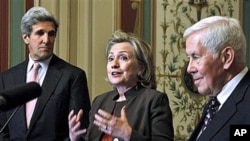The Obama administration is stepping up pressure on the U.S. Senate to ratify a nuclear arms reduction treaty with Russia. Called the New START treaty, it builds on a landmark arms control agreement signed by the United States and the Soviet Union in 1991.
The initial accord expired last year, and the fate of its successor might hinge on the ability of the U.S. Senate to act in a brief, end-of-year session. Secretary of State Hillary Clinton made a high-profile visit to urge prompt ratification of the treaty.
It is called a "full court press" - an all-out administration effort to get key legislation approved by Congress. On Tuesday, Vice President Joe Biden issued a strongly-worded statement warning of grave consequences for U.S. national security if the New START accord is not ratified. The next day, Secretary of State Clinton underscored the point in a corridor near the floor of the U.S. Senate.
"It is, to me, essential that we bring this [treaty] before the Senate. For anyone to think we can postpone it or avoid it is, I am afraid, vastly underestimating the continuing [nuclear] threat that is posed to our country," said Clinton.
Under the New START treaty, U.S. and Russian nuclear arsenals would be reduced by as much as a third.
The chairman of the Senate Foreign Relations Committee, Democrat John Kerry of Massachusetts, highlighted the treaty's benefits and the dangers posed by the status quo.
"Here we have a treaty that, for the first time, provides additional ability to count warheads on both sides," said Kerry. "Here we have a treaty that allows us to have a spot, [unannounced] random inspection to find out what the other side is doing. But for one year now, we have had no inspections, no American boots on the ground in Russia able to protect American interests."
But some Senate Republicans are less than enthusiastic about the treaty. Jon Kyl of Arizona issued a statement Tuesday, saying that the Senate's busy schedule does not permit full consideration of the treaty before the new Congress convenes in January.
Senator Lindsey Graham, a Republican from South Carolina, said he favors arms control, but that he has concerns about New START treaty.
"I think it would be good to have a treaty," said Graham. "But this treaty cannot infringe on the ability of the United States to deploy missile defense systems we think are vital to our national security or [that of] our allies. There is some language in the treaty that creates doubts in [Senate] members' minds. The second hurdle is modernization. Many Republicans, like myself, believe we would be better off with a treaty than without [one, but] - only if we modernize our nuclear deterrent force."
The Obama administration has signaled it intends to increase an $80-billion plan to upgrade and modernize America's nuclear infrastructure.
One of the few Republicans to support ratification of the New START accord is Indiana Senator Richard Lugar, who said he, too, supports nuclear modernization. He adds, however, that the United States can act to improve nuclear security by ratifying the treaty.
"This is very serious. 13,300 [Russian] nuclear warheads aimed at us - our cities, our military installations - everything we have. Thirteen-thousand-three-hundred. Any one of those warheads could obliterate the city of Indianapolis, Indiana [The state's largest city]."
The U.S. Constitution mandates that treaties be negotiated by the executive branch and ratified by the Senate.
Most analysts say ratification will be more challenging come January, when the Democrats' Senate majority will be greatly reduced.
Related video report by Carolyn Presutti:














